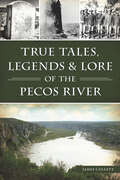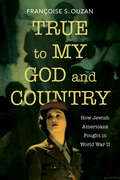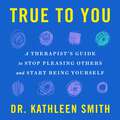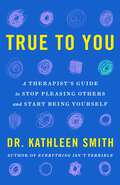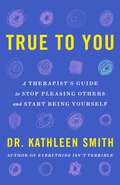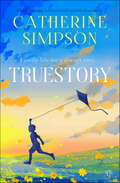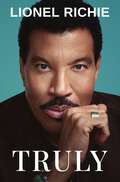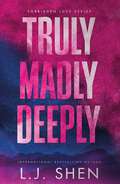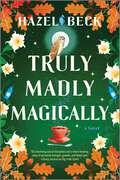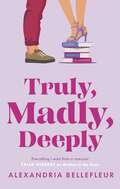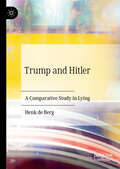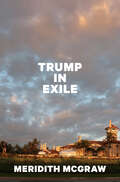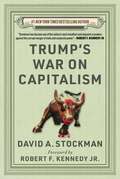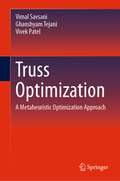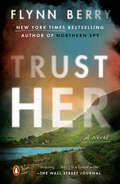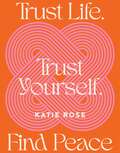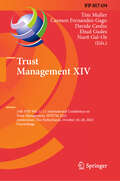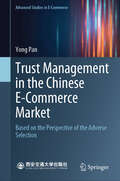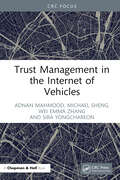- Table View
- List View
True Tales of the Olympic Peninsula (The History Press)
by Carol TurnerA magnificent landscape of rugged peaks, impenetrable rainforest and wild coastlines, Washington's Olympic Peninsula makes a perfect setting for the unexpected.Dive into the stories of pioneers who created wealth and celebrity out of threadbare beginnings and immigrants who found fleeting success in Port Townsend. Discover the unsavory methods of land-grabber Daniel Pullen, who became indirectly responsible for the creation of the Quileute Reservation, and the rumrunning escapades of Claude Alexander Conlin, magician and con man.Author Carol Turner shares tales of daring and desperation amid the remote towns and beautiful scenery of the Olympic Peninsula.
True Tales, Legends & Lore of the Pecos River (American Chronicles)
by James CollettMake a crossing of the storied Pecos River. The arid Pecos River Country of Texas is rich with stories, the crooked path of its alkaline waters defining the lives of any who dared venture here. Native peoples, Spanish explorers, soldiers, travelers, cattlemen, wildcatters, and just plain folks, passed by, struggled, sojourned, and perished. From the oldest book in North America to the great rock of the Jumano, their traces remain in the ruins, the records and the earth itself. Native West Texan James Collett catalogues architectural masterpieces, lonely gravestones, fanciful cowboy tales and other bits of history caught in the currents of a legendary river.
True to My God and Country: How Jewish Americans Fought in World War II (Studies in Antisemitism)
by Françoise S. OuzanTrue to My God and Country explores the role of the more than half a million Jewish American men and women who served in the military in the Second World War. Patriotic Americans determined to fight, they served in every branch of the military and every theater of the war. Drawing on letters, diaries, interviews, and memoirs, True to My God and Country offers an intimate account of the soul-searching carried out by young Jewish men and women in uniform. Ouzan highlights, in particular, the selflessness of servicewomen who risked their lives in dangerous assignments. Many GIs encountered antisemitism in the American military even as they fought the evils of Nazi Germany and its allies. True to My God and Country examines how they coped with anti-Jewish hostility and reveals how their interactions with Jewish communities overseas reinforced and bolstered connections to their own American Jewish identities.
True to You: A Therapist's Guide to Stop Pleasing Others and Start Being Yourself
by Dr Kathleen Smith'A beautiful blend of storytelling, science and practical tools. Smith uses her expertise to introduce true boundary setting tools to build (and rebuild) our relationships to others and ourselves.' Eve Rodsky, New York Times bestselling author of Fair PlayWhen's the last time you felt as composed as you portray to your boss, family and friends? If there's a discord between the two, you're not alone. Humans are master pretenders - we often seem stronger, calmer and more mature than we really are, while the truth is we're full of doubts and self-criticism that pushes us to borrow reassurance from friends, beliefs from strangers on the internet, or attention that, in the moment, makes us feel successful, but leaves us totally hollow and burnt out. Dr. Smith uses examples from her own life and the lives of her therapy patients to explain how we borrow confidence, calmness and beliefs from our relationships and offers solutions and steps for building a life with our own best-thinking. She also unpacks the science of our social nature, explaining why we're so focused on others and teaching us how to interrupt anxious relationship patterns. If a reader is unsure if the career path they're on is one they want to stay on, Dr. Smith will show them how to redefine what a successful career means to them. If they only feel steady when overfunctioning for others, she'll help them learn how to let others be responsible for themselves. By the end of the book, readers will have learnt to stop people-pleasing and be armed with a new set of principles and a new sense of self, ready to stand strong in the face of any challenge.
True to You: A Therapist's Guide to Stop Pleasing Others and Start Being Yourself
by Dr Kathleen Smith'A beautiful blend of storytelling, science and practical tools. Smith uses her expertise to introduce true boundary setting tools to build (and rebuild) our relationships to others and ourselves.' Eve Rodsky, New York Times bestselling author of Fair PlayWhen's the last time you felt as composed as you portray to your boss, family and friends? If there's a discord between the two, you're not alone. Humans are master pretenders - we often seem stronger, calmer and more mature than we really are, while the truth is we're full of doubts and self-criticism that pushes us to borrow reassurance from friends, beliefs from strangers on the internet, or attention that, in the moment, makes us feel successful, but leaves us totally hollow and burnt out. Dr. Smith uses examples from her own life and the lives of her therapy patients to explain how we borrow confidence, calmness and beliefs from our relationships and offers solutions and steps for building a life with our own best-thinking. She also unpacks the science of our social nature, explaining why we're so focused on others and teaching us how to interrupt anxious relationship patterns. If a reader is unsure if the career path they're on is one they want to stay on, Dr. Smith will show them how to redefine what a successful career means to them. If they only feel steady when overfunctioning for others, she'll help them learn how to let others be responsible for themselves. By the end of the book, readers will have learnt to stop people-pleasing and be armed with a new set of principles and a new sense of self, ready to stand strong in the face of any challenge.
True to You: A Therapist's Guide to Stop Pleasing Others and Start Being Yourself
by Kathleen SmithA Guide to The Theory and Practice of Creating Authentic RelationshipsWhen’s the last time you felt as composed as you portray to your boss, family and friends? If there’s a discord between the two, you’re not alone. Humans are master pretenders—we often seem stronger, calmer and more mature than we really are, while the truth is we’re full of doubts and self-criticism that pushes us to borrow reassurance from friends, beliefs from strangers on the internet, or attention that, in the moment, makes us feel successful, but leaves us totally hollow and burnt out. True to You is a relatable self-help guide for people who want to learn to live less focused on others’ reactions and more confidently by their own principles. Readers will learn how to: · Interrupt relationship patterns that keep you stuck. · Rely less on praise and approval from others. · Develop a solid sense of self in anxious times. · Build more authentic and rewarding relationships. Dr. Smith uses examples from the lives of her therapy clients to explain how we borrow confidence, calmness, and beliefs from our relationships and offers actionable steps and exercises for building a life with your own best-thinking. With a healthy dose of humor, she unpacks the science of our social nature, explaining why we try so hard to be what others want us to be and how we can start living from the inside out. By learning how to be more responsible for yourself, rather than over-responsible for everyone else, you can find the freedom to develop richer relationships, pursue what’s important to you, and feel steadier in this very anxious world.
Truestory: A heart-warming and heart-breaking novel about family
by Catherine SimpsonA mother tethered to her home—by an autistic son who&’s tethered to his computer—yearns for freedom in this &“sharply observed&” novel: &“A terrific read.&” —The Herald Alice&’s life is dictated by her autistic son, Sam, who refuses to leave their remote Lancashire farm. Her only escape is two hours in Lancaster on Tuesday afternoons. Then one day, her husband brings rootless wanderer Larry to the farm to embark on a money-making scheme. Alice is hostile—but Larry beguiles Sam with tales of travel in the outside world and, soon, Alice begins to fall for him, too. By turns blackly comic, heartbreaking, and heartwarming, Truestory looks at what happens when sacrifice slithers towards martyrdom, and how even when we feel trapped in our lives, we sometimes have more options than we realise. &“Moving but never mawkish, and ultimately hopeful, providing a sympathetic portrait of a family struggling with autism in straitened times. Sam&’s on-line interactions with a motley group of friends are laugh-out-loud funny.&” —Sunday Mirror &“[Simpson&’s] writing is vivid, perceptive and acute.&” —James Robertson, Walter Scott Prize–winning author of News of the Dead
Truly
by Lionel Richie“Richie is refreshingly open in the book, which functions as both a fun memoir and a love letter to music and his beloved Tuskegee… There’s an abundance of love and gratitude in this wildly entertaining, utterly charming memoir.” – Kirkus, STARRED review. <P><P> The long-awaited memoir of the legendary Lionel Richie. As a storyteller second to none, Lionel Richie is ready to tell it all. In this intimate, deeply candid memoir, Lionel revisits hilarious and harrowing events to inspire all who doubt themselves or feel their dreams don’t matter. Lionel chronicles lessons learned during his unlikely story of remarkable success—his dramatic transformation from painfully shy, “tragically” late bloomer to world-class entertainer and composer of love songs that have played as the soundtrack of our lives. <P><P> Funny, warm, and riveting, Lionel recalls his childhood in Tuskegee, Alabama, where he grew up on its university campus during the heyday of the Civil Rights movement, raucous adventures as a member of The Commodores, coming-of-age in late 1960s Harlem, culture shock playing gigs on the French Riviera, the big break of being signed to Motown, his meteoric solo career that included an Olympics performance witnessed by two billion around the globe, all the way through to writing and recording “We Are the World” and his current multi-generational fame as a judge on American Idol. Even with its turbulence, loss, and near-calamity, Lionel’s journey takes us on a thrill ride and delivers a memoir for the ages—reminding us of the power of love to elevate our own lives and our world. <P><P> Lionel Richie’s memoir includes three eight-page photo inserts. <P><P> <B>New York Times Bestseller</B>
Truly Madly Deeply: the must-read enemies to lovers, best friend’s brother romance that’s intense, spicy, and addictive, from the co-author of MY DARK ROMEO (Forbidden Love Series)
by L.J. Shen"You're going to be the death of me.""Here's hoping."This old flame just might set them on fire . . . 🔥 🔥 🔥Conceited, unattainable, and downright delicious, renowned Michelin-starred chef Ambrose Casablancas has one passion in life―food.Women are a distraction, and he doesn't do those. Especially not Cal Litvin, his little sister's best friend. Although the two of them have a secret shared past, now her entire existence is a complication for him: she's awkward, eccentric, infuriating . . . and she's also hotter than his kitchen.But Cal is back in their hometown after her father's death to nurse her mother's broken heart. And, finding herself jobless, hopeless and penniless, she is forced to show up on the doorstep of Ambrose's new restaurant to find work.For Cal, falling for the bad boy the second time around would be a huge mistake, But Ambrose's resolve, like this patience, is ebbing each day Cal works at his restaurant . . .Because Cal is no longer a doe-eyed girl. Now, she's a woman that Ambrose will do anything to conquer.For fans of Ana Huang and Lauren Asher, Truly Madly Deeply is an intense, addictive and very sexy second-chance, enemies-to-lovers, best friend's brother romance that you won't be able to put down . . .This is the start of the new Forbidden Love series, but can also be read as a standalone.TROPES: 🔥 Best friend's brother 🔥 Grumpy x sunshine 🔥 Boss & employee 🔥 Enemies to lovers 🔥 Second chance romance 🔥 Billionaire romance 🔥 Forced proximity 🔥 A lot of angst🌶️ 🌶️ 🌶️READERS ARE OBSESSED WITH TRULY MADLY DEEPLY:'Let's just say you seriously WILL NOT be disappointed' ⭐⭐⭐⭐⭐'This? THIS IS THE BEST' ⭐⭐⭐⭐⭐'I loved reading Cal and Row's story. I ship them. I worship them' ⭐⭐⭐⭐⭐'Beautiful, anxious, funny, heart wrenching, and any other emotion you can experience'⭐⭐⭐⭐⭐'Devoured this in less than 24 hours' ⭐⭐⭐⭐⭐'Are you ready for delicious adventure that is spiced with love, angst and amazing friendship? . . . Chefs kiss masterpiece that won my heart from the start!' ⭐⭐⭐⭐⭐'It was sweet. It was steamy. It was romantic. It was CHEF'S KISS' ⭐⭐⭐⭐⭐
Truly Madly Magically (Witchlore #3)
by Hazel Beck&“An absolute delight of a magical tale.&” —Louisa Morgan, author of The Age of Witches, on Small Town, Big MagicA USA TODAY BESTSELLER!A witch cursed to tell the truth, and the man who won&’t let her lie to herself anymore…Cursed by her own mother to always tell the truth and one of the only half-witches around, Ellowyn Good has never considered herself an equal part of the Riverwood coven. But when the Joywood, the evil rulers of the witching world, target her directly, she begins to wonder why they want her gone. She&’ll need to work with her newly formed coven to survive, which includes dealing with her first love, past wreckage and a whole new complication she didn&’t see coming. With their fates in the balance, Ellowyn will have to learn to trust Zander again—or be doomed to repeat the mistakes of the past. Assuming they all survive the Joywood&’s latest bid for absolute power over the witching world…Want more witchy romance? Read the entire Witchlore Series:Book 1: Small Town, Big MagicBook 2: Big Little SpellsBook 3: Truly Madly MagicallyBook 4: Dragon Fires Everywhere (Coming September 2025)
Truly, Madly, Deeply
by Alexandria Bellefleur'You can never go wrong with an Alexandria Bellefleur novel' BuzzfeedThe new steamy queer rom-com from bestselling author, Alexandria Bellefleur - perfect for fans of Ashley Herring Blake, Casey McQuiston and Talia Hibbert.As a bestselling romance novelist, everyone thinks Truly Livingston is an expert on happily-ever-afters. Except she just caught her fiancé cheating, her parents are separating and her entire view on love has been shaken to the core.Already committed to recording a podcast sharing relationship advice, Truly hopes it will be the perfect distraction . . . until she meets her co-host. Her first impression of Colin McCory is . . . hot. But then he opens his extremely kissable mouth. Bickering with a cynical divorce lawyer is the last thing Truly needs - so she walks out, with no plans to return.When Colin tracks her down, begging for a fresh start, she reluctantly agrees. And as they turn from enemies to friends, she discovers they have more in common than she ever imagined, including their shared queerness. With their mutual attraction reaching a fever pitch, Truly feels happy for the first time in years. Yet she can't help but wonder . . . is Colin truly, madly, deeply in love with her? Or is it all too good to be true?Why readers love Alexandria Bellefleur . . . 'Everything I want from a rom-com: fun, whimsical, sexy' Talia Hibbert'I was hooked from the very first page!' Christina Lauren'This book is a delight' New York Times Book Review'Sparkles with a delightful mix of wit, humour and good-natured sarcasm' Mia Sosa
Truly, Madly, Deeply
by Alexandria Bellefleur'You can never go wrong with an Alexandria Bellefleur novel' BuzzfeedThe new steamy queer rom-com from bestselling author, Alexandria Bellefleur - perfect for fans of Ashley Herring Blake, Casey McQuiston and Talia Hibbert.As a bestselling romance novelist, everyone thinks Truly Livingston is an expert on happily-ever-afters. Except she just caught her fiancé cheating, her parents are separating and her entire view on love has been shaken to the core.Already committed to recording a podcast sharing relationship advice, Truly hopes it will be the perfect distraction . . . until she meets her co-host. Her first impression of Colin McCory is . . . hot. But then he opens his extremely kissable mouth. Bickering with a cynical divorce lawyer is the last thing Truly needs - so she walks out, with no plans to return.When Colin tracks her down, begging for a fresh start, she reluctantly agrees. And as they turn from enemies to friends, she discovers they have more in common than she ever imagined, including their shared queerness. With their mutual attraction reaching a fever pitch, Truly feels happy for the first time in years. Yet she can't help but wonder . . . is Colin truly, madly, deeply in love with her? Or is it all too good to be true?Why readers love Alexandria Bellefleur . . . 'Everything I want from a rom-com: fun, whimsical, sexy' Talia Hibbert'I was hooked from the very first page!' Christina Lauren'This book is a delight' New York Times Book Review'Sparkles with a delightful mix of wit, humour and good-natured sarcasm' Mia Sosa
Truly, Madly, Deeply: A Novel
by Alexandria BellefleurSparks fly when a lovelorn romance novelist and a divorce lawyer who has sworn off relationships agree to cohost a podcast series offering dating advice to viewers, in Truly, Madly, Deeply, the next steamy queer rom-com from Lambda Literary Award winner and national bestselling author Alexandria Bellefleur.As a bestselling romance novelist, everyone thinks Truly Livingston is an expert on happily-ever-afters. She’s even signed on to record a podcast sharing relationship advice. Little do they know she feels like an imposter—her parents just announced they’re separating, she caught her fiancé cheating, and her entire view on love has been shaken to the core. Truly hopes the podcast will distract her... until she meets her cohost.Her first impression of Colin McCory is...hot. But then he opens his extremely kissable mouth. Colin’s view on love just pisses Truly off, even if he does have an annoyingly attractive face. Bickering with a cynical divorce lawyer is the last thing she needs—so she walks out, with no plans to return.A few days later, Truly is surprised when Colin tracks her down, asking for a fresh start. Truly can’t deny the little thrill she gets from Colin begging, so she reluctantly agrees. As they go from enemies to friends to something else entirely, Truly discovers they have more in common than she ever imagined, including their shared queerness. He’s a genuinely good guy—charming, sweet, and equally as unlucky in love as herself—and there’s something about Colin that drives Truly a little wild. When their attraction reaches a fever pitch, Truly is happy for the first time in years. Yet she can’t help but wonder... is Colin truly, madly, deeply in love with her? Or is it all too good to be true?
Trump and Hitler: A Comparative Study in Lying
by Henk de BergThis book compares Trump and Hitler as political performance artists. It explores their populist self-staging and rhetorical strategies and explains how they connected with their respective audiences. It also analyses the two men’s character, work ethic, and management style. In addition, the book addresses seemingly peripheral issues like the reasons behind Hitler’s toothbrush moustache and Trump’s hairstyle. By demystifying Hitler and Trump, the author throws new light on both of them.
Trump in Exile
by Meridith McGrawFilled with deep insights and never-before-seen details, Trump in Exile is an explosive, all-access account from behind the scenes at Mar-a-Lago as former president Donald Trump regroups from an election defeat that he refuses to acknowledge and plots his return. The Capitol riots on January 6, 2021, put a horrific closing note on a norm-shattering presidency, as the twice-impeached Donald Trump rode a wave of denial and resentment out of 1600 Pennsylvania Avenue and crashed back at Mar-a-Lago—seemingly wounded, seemingly done. But he wasn&’t. And what, exactly, was he building in there? Meridith McGraw vividly chronicles the incredible period of Trump&’s exile in South Florida—a postpresidency like no other in American history—and brings us inside the gilded walls of his private club, where an alternate reality in which the 2020 election was stolen became Republican Party orthodoxy. How did the country go from Trump&’s political banishment to his renewed dominance over his party, as he effortlessly destroyed the once-formidable Ron DeSantis and now stands on the verge of returning to the White House—all while facing the heavy shadow of multiple federal and state criminal indictments? The Mar-a-Lago period is essential for understanding Trump&’s implausible resurgence and the many missed opportunities to stop him. From a reporter who has covered the Trump era from its beginning, through the White House years, to his 2024 campaign, Meridith McGraw&’s Trump in Exile is riveting contemporary history, vital to our understanding of this defining American moment.
Trump's War on Capitalism
by David StockmanDonald Trump had all the right enemies while in office—but that was about all he had right. And with the election of 2024 fast approaching, the essence of the moment is this: Lock him out of both the nomination and the Oval Office. David Stockman, the New York Times and Wall Street Journal bestselling author of The Great Deformation, dissects Trump&’s economic policies and exposes him as the failed businessman that he is—not a conservative and definitely not a Republican. The border wall, the tariff war with China, and Trump&’s disastrous response to COVID-19 were all remarkably misguided failures of policy that hurt American prosperity. Even his claims of job creation fell flat too—Trump&’s tenure was the only presidential term in which private payrolls in the US economy actually shrank—well, at least since Herbert Hoover! America cannot endure another four years of Donald Trump. Nor, can it tolerate another election where a woebegone Democrat wins by default owing to the simple fact that they are not Donald Trump. Trump&’s War on Capitalism exposes his miserable record as a big spender, easy moneyman, hard-core protectionist, immigrant-basher, militarist, and all-around Big Government statist—all reason enough to lock Trump out of the 2024 election.
Trump, White Evangelical Christians, and American Politics: Change and Continuity
by Anand Edward Sokhey and Paul A. DjupeIn Trump, White Evangelical Christians, and American Politics, political scientists Anand Edward Sokhey and Paul A. Djupe bring together a wide range of scholars and writers to examine the relationship between former President Donald Trump and white American evangelical Christians. They argue that, while this relationship—which saw evangelicals supporting a famously unfaithful, materialistic, and irreligious candidate despite self-defining in opposition to these characteristics—prompted many to wonder if Trump himself transformed American evangelical religion in politics, this alliance reflected both change and the outcome of dynamics that were in place or building for decades.Contributors contextualize the Trump presidency within the story of religious demographic change, the growth of politicized religion, nationalistic religious expression, and the ways religion and politics in the United States are enmeshed in the politics of race. These investigations find that the idea of religious “transformation” is not accurate. Instead, the years 2015 to 2022 saw mainly minor changes to the ways religion appeared in public life—but these changes ultimately complemented and advanced an existing white evangelical strategy to increase political and social power as they became a demographic minority in the United States. Taken together, this collection reveals new insights for readers seeking to understand the religious dimensions of Trump’s rise, the reasons evangelicals become political activists, and the multifaceted alliances between secular politicians and conservative religious subcultures.Contributors: Abraham Barranca, Ruth Braunstein, Ryan P. Burge, David E. Campbell, Jeremiah J. Castle, Paul A. Djupe, John C. Green, Sarah Heise, Geoffrey C. Layman, Andrew R. Lewis, Gerardo Martí, Eric L. McDaniel, Napp Nazworth, Shayla F. Olson, Enrique Quezada-Llanes, Kaylynn Sims, Anand Edward Sokhey, Hilde Løvdal Stephens, Kyla K. Stepp, Allan Tellis.
Trunk-or-Treat
by Chris Ayala-KronosA festive Halloween picture book inspired by the abundantly decorated cars and trucks, snazzy costumes, and sweet treats of community-centric Trunk-or-Treat events!Snazzy costumes, spooky decorations, and sticky candy…all on WHEELS! This rhyming Halloween picture book appeals to car and vehicle lovers with an ode to the growing Trunk-or-Treat trend. Trunk-or-Treats have been gaining in popularity the last few years as a safer alternative or addition to classic door-to-door trick-or-treating. Follow a family as they attend a community Trunk-or-Treat during the Halloween season!
Truss Optimization: A Metaheuristic Optimization Approach
by Vivek Patel Vimal Savsani Ghanshyam TejaniThis book provides a comprehensive study of structural design and optimization of different truss structures for size, shape, and topology of structure. It describes truss optimization based on into three categories: size optimization, shape optimization, and topology optimization.It also studies the performance of metaheuristic algorithms developed after 2011 for truss optimization problems. The results highlight the best approach to achieve the best performance of the structural design. Pseudo codes of all the methods are provided at the end of the book so that it can be used by the researchers, practitioners, and students to test it for different real-world systems.This book ideal for structural design engineers to realize the appropriate systems with properly optimized parameters as well as designers, practitioners, consultants involved in structural designs, researchers, academics, and graduate students in mechanical, civil, and architectural engineering.
Trust Her: A Novel
by Flynn Berry&“Flynn Berry is a must-read for me. Trust Her delivers her trademark blend of riveting suspense and beautiful emotional depth. You will love this novel.&” —Laura Dave, #1 New York Times–bestselling author of The Last Thing He Told Me&“Gripping . . . Ms. Berry is a lyrical writer who can set scenes both explosive and domestic.&” —Wall Street JournalTwo sisters find they can&’t outrun their past in the riveting new thriller from the New York Times–bestselling author of Northern Spy, a Reese&’s Book Club pickThree years after they narrowly escaped the IRA&’s worst punishment for informing, Northern Irish sisters Tessa and Marian Daly have built a new life in Dublin with their young children. Though Tessa is haunted by the abrupt and violent end to her old life, she does her best to immerse herself in the joys of Finn&’s childhood and the rhythms of her new job at The Irish Observer.It&’s a small island, though, and just as quickly as they disappeared, figures from the sisters&’ past surface to drag them back into the conflict. Tessa is told she must track down her old handler from MI5, Eamonn, and attempt to turn him into an IRA informant, or lose everything.Tessa&’s reunion with Eamonn revives a host of feelings she has long attempted to bury. As their relationship intensifies and the pressure mounts, long-held secrets rise to the surface, and Tessa must navigate a treacherous landscape of shifting loyalties, all while trying to protect her beloved son.With her signature hair-raising suspense, razor-sharp prose, and rich emotional depth, Edgar Award winner Berry has crafted both an unforgettable portrait of two fierce women in the Daly sisters and her most spellbinding thriller to date.
Trust Life, Trust Yourself, Find Peace
by Katie Rose'Pure gold.' - Biet Simkin, Author of Don't Just Sit There'Wise and practical.' - Sharon Gannon, Founder of Jivamukti Yoga'Practical and enriching in equal measure.' - Elena Brower, AuthorHave you lost faith in the idea that the Universe is working for you, rather than against you? Have you dreamt of making big changes in your life but find yourself stuck in a routine, with habitual patterns that feel hard to break out of? Or maybe you jump into change and adventure a little too quickly, and as a result you've been burnt and find it hard to believe that things will ever work out again.Learning to trust your own judgement, and that the Universe supports you - even when things feel really tough - is within your reach. When trust is deep enough, we know that even if we fail, we've won because we had a go and that is all life is asking of us.Drawing on modern psychology as well as elements of ancient philosophy and yogic wisdom, author Katie Rose guides you through the dance between being in your power and surrendering, as you learn to trust yourself every step of the way.
Trust Life, Trust Yourself, Find Peace
by Katie Rose'Pure gold.' - Biet Simkin, Author of Don't Just Sit There'Wise and practical.' - Sharon Gannon, Founder of Jivamukti Yoga'Practical and enriching in equal measure.' - Elena Brower, AuthorHave you lost faith in the idea that the Universe is working for you, rather than against you? Have you dreamt of making big changes in your life but find yourself stuck in a routine, with habitual patterns that feel hard to break out of? Or maybe you jump into change and adventure a little too quickly, and as a result you've been burnt and find it hard to believe that things will ever work out again.Learning to trust your own judgement, and that the Universe supports you - even when things feel really tough - is within your reach. When trust is deep enough, we know that even if we fail, we've won because we had a go and that is all life is asking of us.Drawing on modern psychology as well as elements of ancient philosophy and yogic wisdom, author Katie Rose guides you through the dance between being in your power and surrendering, as you learn to trust yourself every step of the way.
Trust Management XIV: 14th IFIP WG 11.11 International Conference on Trust Management, IFIPTM 2023, Amsterdam, The Netherlands, October 18–20, 2023, Proceedings (IFIP Advances in Information and Communication Technology #694)
by Nurit Gal-Oz Ehud Gudes Carmen Fernandez-Gago Davide Ceolin Tim MullerThis book constitutes the refereed post-conference proceedings of the 14th IFIP WG 11.11 International Conference on Trust Management, IFIPTM 2023, held in Amsterdam, The Netherlands, during October 18–20, 2023. The 7 full papers, 2 short papers and 2 position papers presented were carefully selected from 22 submissions. They focus on all topics related to trust, security, and privacy such as: Trust in Information Technology and Security; Trust and Identity Management; Socio-Technical and Sociological Trust; and Emerging Technology for Trust.
Trust Management in the Chinese E-Commerce Market: Based on the Perspective of the Adverse Selection (Advanced Studies in E-Commerce)
by Yong PanBased on the classic adverse selection model, this book sets up the cyber “lemons” market model and analyzes the basic rule of asymmetric information. This book focuses on the topics as following: Is there “lemons” in e-commerce market? What rule do the cyber “lemons” characterize? How to build the cyber “lemon” market model? What is the particularity of adverse selection in cyber markets? What is more, how to eliminate or avoid the cyber “lemons” in Chinse e-commerce market?This book aims to provide the accumulation for e-commerce research and support decision-making for management in Chinese e-commerce markets, and suggests trust management solutions to eliminate or decrease the cyber ‘lemons’. Through this book, it helps readers understand the ideas and effective methods of trust management in the Chinse e-commerce market, while deepening the reverse selection model and theory.
Trust Management in the Internet of Vehicles
by Michael Sheng Wei Emma Zhang Adnan Mahmood Sira YongchareonThe Internet of Vehicles (IoV) is referred to as an efficient and inevitable convergence of the Internet of Things, intelligent transportation systems, edge / fog and cloud computing, and big data, all of which could be intelligently harvested for the cooperative vehicular safety and non-safety applications as well as cooperative mobility management. A secure and low-latency communication is, therefore, indispensable to meet the stringent performance requirements of the safety-critical vehicular applications. Whilst the challenges surrounding low latency are being addressed by the researchers in both academia and industry, it is the security of an IoV network which is of paramount importance, as a single malicious message is perfectly capable enough of jeopardizing the entire networking infrastructure and can prove fatal for the vehicular passengers and the vulnerable pedestrians. This book thus investigates the promising notion of trust in a bid to strengthen the resilience of the IoV networks. It not only introduces trust categorically in the context of an IoV network, i.e., in terms of its fundamentals and salient characteristics, but further envisages state-of-the-art trust models and intelligent trust threshold mechanisms for segregating both malicious and non-malicious vehicles. Furthermore, open research challenges and recommendations for addressing the same are discussed in the same too.

